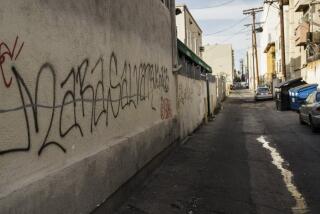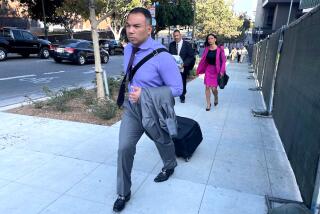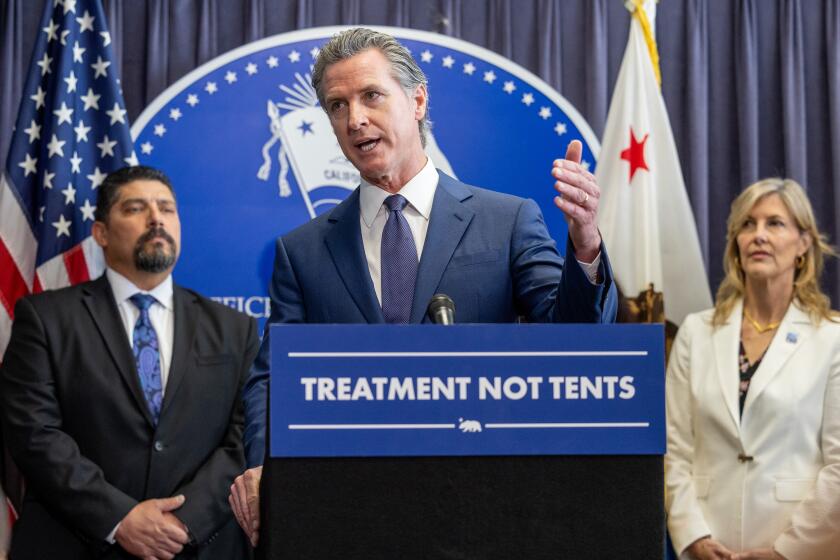U.S. charges top leaders of Tijuana-based drug cartel
Federal authorities announced a wide-ranging criminal case Friday against top leaders of a Tijuana-based drug cartel that ran much of its operations from the San Diego area, allegedly ordering murders, kidnappings and torture of rival traffickers in Mexico.
The racketeering conspiracy case charges 43 cartel lieutenants, enforcers and drug traffickers, among them half a dozen current or former Mexican law enforcement officers, including a top official in the Baja California attorney general’s office who allegedly passed along information obtained from U.S. law enforcement to cartel leaders.
The organized crime group, an offshoot of the Arellano Felix drug cartel, moved some operations to San Diego in recent years, seeking a safe haven from gang wars and law enforcement crackdowns south of the border, said Laura Duffy, the U.S. attorney in San Diego.
The case marks the latest example of organized crime groups in Tijuana trying to take advantage of the cross-border environment to hamper investigations and hide from rivals and police. The allegations also are a stark illustration of how deeply the cartels have infiltrated Mexican law enforcement in Baja California.
U.S. prosecutors allege that cartel members in Mexico kidnapped and killed several people, then tried to shift responsibility in some of the cases to rival gangs through corrupt Mexican law enforcement. In California, U.S. authorities employing undercover agents and heavy surveillance were able to prevent most violent attacks, including six attempted murders and an attempted kidnapping, Duffy said.
Thirty-one of the 43 defendants are in custody, authorities said. Four were arrested in Mexico by authorities there, and 27 in cities around San Diego County, from Imperial Beach to upscale Poway.
The 20-month investigation was run by the multiagency San Diego Cross Border Violence Task Force, which took advantage of tools often unavailable to those investigating Mexican drug cartels, such as telephone wiretaps, cameras and informants.
“The presence of foreign-based drug-trafficking organization members and associates in San Diego will not be tolerated,” said Duffy, a veteran federal prosecutor who recently was named U.S. attorney in San Diego.
Organized crime groups in the past have shifted some operations north of the border, most notably in the mid-1990s, when some leaders of the once-powerful Arellano Felix drug cartel moved to the San Diego area. Such moves allow cartel associates to escape threats in Mexico, but leave them vulnerable to U.S. authorities.
The organization targeted in Friday’s crackdown is allegedly led by Fernando Sanchez Arellano. A nephew of the founders of the Arellano Felix drug cartel, he was not among those charged.
According to the criminal complaint filed in San Diego federal court, those associated with the group employed the kind of vicious tactics commonly seen in recent years in Tijuana.
Suspects allegedly placed the defaced headstone from the gravesite of two murder victims in the victims’ family courtyard in Tijuana. They sought to videotape a beheading of a rival trafficker so it could be posted on the Internet, according to the complaint.
Six current or former Mexican law enforcement officials are among those charged. They allegedly ran assassination hit squads, blocked homicide investigations and provided a photographic roster of Baja California state police officers so they also could be targeted for assassination or corruption.
Perhaps most troubling of all, officials said, was the arrest of Jesus Quinones Marques, director of the international liaison office for the Baja California attorney general’s office. He was detained Thursday after a traffic stop in San Diego. It was a potential setback for U.S. law enforcement agencies that work closely with counterparts in Mexico to hunt down U.S. fugitives and build cases against powerful drug-trafficking organizations.
Authorities said some information shared by U.S. liaison officers with Quinones was compromised, but that nobody’s safety was put at risk. Quinones, who also cultivated relationships with local reporters, allegedly tried to plant stories in Mexican media outlets that placed the blame for killings on a rival gang run by Teodoro Garcia Simental, nicknamed El Teo, who was battling Sanchez Arellano for control of key drug-trafficking routes through Tijuana.
Quinones seemed like a cooperative and professional liaison officer, according to U.S. liaison officers, but some said they are never surprised when their counterparts turn out to be corrupt. Liaison officers usually limit conversations related to sensitive investigations.
“At meetings, we don’t share critical information,” said Jesse Navarro, public affairs officer for the San Diego County district attorney’s office. “We have to be cautious.”
More to Read
Start your day right
Sign up for Essential California for news, features and recommendations from the L.A. Times and beyond in your inbox six days a week.
You may occasionally receive promotional content from the Los Angeles Times.







